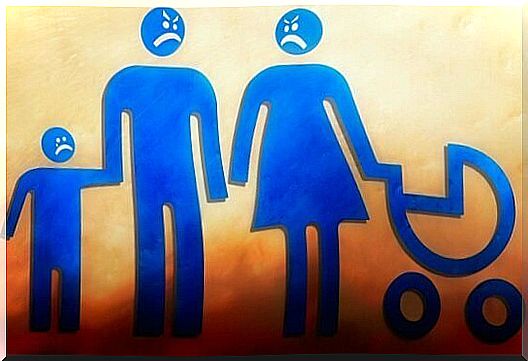Invalidating Family: An Obstacle To Personal Development

An invalidating family is one that hinders or stops the personal development of the members. It implements a series of mechanisms that create uncertainty. It undermines the self-confidence of family members, and as a result creates a feeling of inability that hinders personal growth.
We all know that the family is our most basic social core. In this core, people can learn to relate to other people. We learn the patterns that this core transmits to us, and these help us relate to the environment.
In an invalidating family, however, the behavioral patterns one learns are incorrect. We learn to live our lives full of anxiety and guilt. Families like these reset their members in so many different ways. Members often have great difficulty adapting to their surroundings later in life. Therefore, they often stay at home with the family well into old age.
One of the most common mechanisms in the invalidating family is overprotection. There is an excessive emphasis on removing the person from all potential danger. It is based on the notion that the world is full of threats. The reason for this extreme protection is to avoid falling victim to them.

What lies behind this upbringing style is anxiety, dependence and low self-esteem. Anxiety generates images of fear and guilt. Parents do not want their children to suffer and are afraid that they will be hurt if they are given responsibility. However, this does not lead to happier children. The exact opposite, in fact. That’s the height of an invalid family.
People who grow up in such a family do so with a sack that is slowly but surely filled with fears. Just leaving home scares them to a greater or lesser extent. The most serious of all is that they do not identify the resources they have within themselves to tackle difficulties or achieve their goals. That’s what parents are for. They are the ones who know.
An invalidating family overprotects due to an underlying anxiety. But at the same time, it sends implicit messages of superiority. I can do it, but not you. The family will protect you, you can not protect yourself. In this way, strong bonds are created by addiction, low self-efficacy and poor self-esteem.
Basically , many parents who practice this type of parenting have discovered that their children may be a reason not to think about their own problems. They make their children’s problems their own because they are often easier to solve.
We are talking about people who carry a heavy burden of frustration and emptiness. Their children give them an excuse to postpone the conversation they should have with themselves indefinitely.

This is why they prolong their children’s dependence on them as much as possible. This is one of the mechanisms by which an invalidating family is created. If things continue like this, the children will find it difficult to leave the nest, if they are lucky at all.
In addition, they will need the family again and again during their lives to solve things.
It is not easy to break through the fence set up by an invalidating family. One of the reasons for this is that people do not admit that their family environment is extremely unhealthy. The parents build up the idea that the family does everything for the best interests of the child, and the children believe that this is true.
So many sacrifices, so much nurtured. It is often very difficult to understand that this is very unhealthy and that “love” is actually meaningless.
Those who are part of an invalidating family often become very insecure and very stubborn at the same time. They have a low tolerance for frustration, which is why it is difficult for them to set goals that they achieve. They generally feel inferior to others and often assume the role of victim. This is because they have been so overprotected in their family environment.

The only way out of this vicious circle is by learning the patterns provided by parents. Something that is easier said than done. The individual must break with a structure that the people he loves most have created and where he feels safe.
The idea of facing one’s fears without a protective environment seems appalling. They see it as an ungrateful act against the people who protected them, and also that it is an unnecessary risk.
Because they do not have the support of their family for this, they often go to therapists or others who can compensate for their lack of self-confidence. But they must be careful so that the circle does not start again.
Yes, asking for help is an important first step. But this help should be to give us a strong foundation in life so that we can stand on our own two feet.








